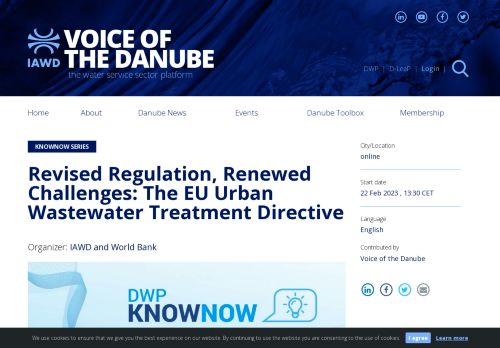
Voice of the Danube
Three decades after the introduction of the European Urban Wastewater Treatment Directive, a large-scale revision is now approaching the finish line. It brings answers to challenges and threats that either weren't there or weren't recognized 30 years ago.
Originally born out of improvised digital responses during the Covid crisis, the Danube Water Program's KnowNow webinars have found a sizeable fanbase and are now a staple in the information menu of water service sector professionals everywhere in the region. They give very compressed 75-minute rundowns on burning current topics, usually in the format of a presentation plus panel discussion with questions from the audience included in the exchange.
22 February brought a first in the history of the KnowNows – a webinar that blew its timeframe. “Maybe we should have another session soon and schedule two hours”, remarked Michel Sponar, Deputy Head at the European Commission's Directorate-General for Environment at the end of a lively discussion that had generously overdrawn the available time budget, because the day's topic was the current revision of the European Urban Wastewater Treatment Directive, and here the stakes are extra high.
Moderated by World Bank Senior Water Resource Specialist and DWP Team Leader Raimund Mair, the webinar started with Mr. Sponar's presentation on the intentions, processes and recommendations of the ongoing revision of the directive that had come into effect in 1991 and still keeps giving one generation later: “The results are tangible”, says Michel Sponar. “We have managed to really improve the infrastructure everywhere in the EU, and we have improved the water quality measurably.” Still, a recent in-depth analysis identified plenty room for improvement, and this will be addressed by a revision which is currently under discussion at the European Parliament and Commission, with position statements of both expected shortly.
Mr. Sponar walked the audience through the content of the draft, pointing out numerous changes with considerable impact: The new directive will expand its coverage from 2000+ pe to 1000+pe agglomerations, include integrated rain water management as a general objective, set reinforced standards for nitrogen and phosphorus removal, and bring a new emission standard for micropollutants, with a risk-based approach and producer responsibility rules. Energy neutrality for the waste water sector will another important objective of the revision, as well as increased transparency of the sector as driver for performance improvements, improved access to sanitation for marginalized groups and a set of public health measures, including virus monitoring of wastewater.
The proposed changes will produce total costs of 3,8 billion Euros per year with the cost/benefit analysis promising benefits higher than the costs in every single member state of the Union.
Following Mr. Sponar's presentation, three panelists were invited to comment. First to take the stage was Sanja Barbalic, Head of the Water Management Institute at Croatian Waters. She pointed to the challenges for small countries with low population densities and strong depopulation trends in rural areas, noting that the expanded coverage of the revised directive will force implementation planners back to the drawing board and present countries like Croatia with considerable challenges to find the necessary manpower für managing the necessary changes.
Next, Enkelejda Gjinali of the Polytechnic University of Tirana, Albania, presented the perspective of a candidate state. Having entered formal membership negotiations last year, Albania is currently finalizing the first two directive-specific implementation plans for the Drinking Water Directive and Urban Wastewater Treatment Directive, based on the currently valid criteria. 2,3 billion euros will be needed to fully implement the current Urban Waste Water Treatment Directive in Albania, and the revised directive will present considerable additional challenges.
Finally, Csaba Bauer of Romania's Aquaserv utility company added the operational perspective, noting two main issues with the revised directive, one being the very tight deadlines, the other being costs: “We are discussing two kinds of costs here, one being investment costs, and hopefully we will benefit from EU funds here, but we also have to mind operational costs.” Mr. Bauer's company is currently assessing the situation regarding nutrients, micropollutants, and energy neutrality, the latter causing special headaches because some facilities simply do not have the necessary space to install additional anaerobic digestors or solar plants. He notes: “I don't see the necessary terrain for all the installations needed to create energy independence.”
Yet, all panelists agreed that the revision will bring considerable opportunities. Sanja Barbalic welcomes the opportunity for a heavily tourism-dependent country like Croatia to improve the communication with the population about the value of a healthy environment and functioning infrastructures, to improve energy efficiency, and to improve wastewater treatment and sludge management. She also sees a tremendous opportunity in the proposed producer involvement. Enkelejda Gjinali is looking forward to her country profiting from the collective experience of decades of implementing environmentally friendly measures, and Csaba Bauer is looking forward to reading the final version of the new Urban Wastewater Treatment Directive, wishing everybody involved “the power to implement it and to be happy with it”.
A comprehensive summary, the presentation provided as well as the webinar video are available under the link below.
VoD - Revised Regulation, Renewed Challenges: The EU Urban Wastewater Treatment Directive
The Danube Water Program “KnowNow” webinar series focuses on up-to-date topics relevant for the water sector in the Danube region. This webinar will highlight the results of the revision of the EU Urban Waste Water Treatment D...




